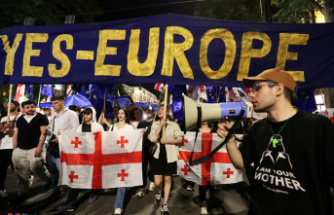Schwerin (dpa/mv) - In court proceedings over the use of an undercover investigator at the 2007 G8 summit in Heiligendamm, the parties to the dispute agreed on a settlement. Both sides had agreed not to continue the process, said a spokeswoman for the Administrative Court in Schwerin on Monday after a hearing. The agreement only provides for the distribution of the procedural costs.
Born in the US, Jason Kirkpatrick sued the state of Mecklenburg-Western Pomerania in 2016 because he considered the use of an informer by the State Criminal Police Office (LKA) to be an encroachment on his fundamental rights. According to the spokeswoman, Kirkpatrick wanted to use his lawsuit to have the operation declared illegal. He could have asserted financial claims in further proceedings.
As the state government had already admitted in 2011, the LKA employed an undercover investigator from the British police with the code name Mark Stone. In 2007, he researched the left-wing extremist scene in Mecklenburg-Western Pomerania and Baden-Württemberg. The country paid for the undercover investigator's travel, accommodation and subsistence costs during the G8 summit in Heiligendamm.
The administrative court in Schwerin has now announced that there are hardly any documents. The country informed Kirkpatrick in 2011 that no data was stored about him. It remained unclear whether there was any data about him at all and whether it had been deleted due to legal regulations.
The state of Mecklenburg-Western Pomerania also did not give parts of files to the court for reasons of confidentiality. The plaintiff had withdrawn an application for the British police officer who was undercover to be questioned as a witness. The British police authorities refused to allow the British police officer and his leaders to testify about the deployment in Germany.
On Monday, the court pointed out to those involved that there were difficulties in providing evidence and unresolved legal issues - but also that the deployment without a judicial decision was fundamentally illegal, as it was said. The extent to which the plaintiff suffered damage in the specific case had not been decided, however, said the spokeswoman.
The summit of the eight leading industrialized countries took place in June 2007. The security precautions were enormous, with around 16,000 police officers there was the largest police operation in the Federal Republic at that time.












